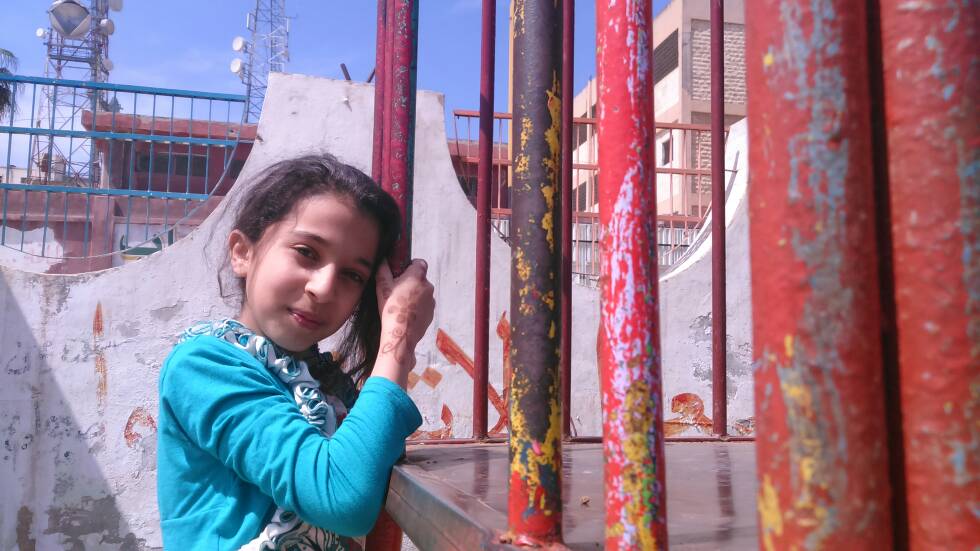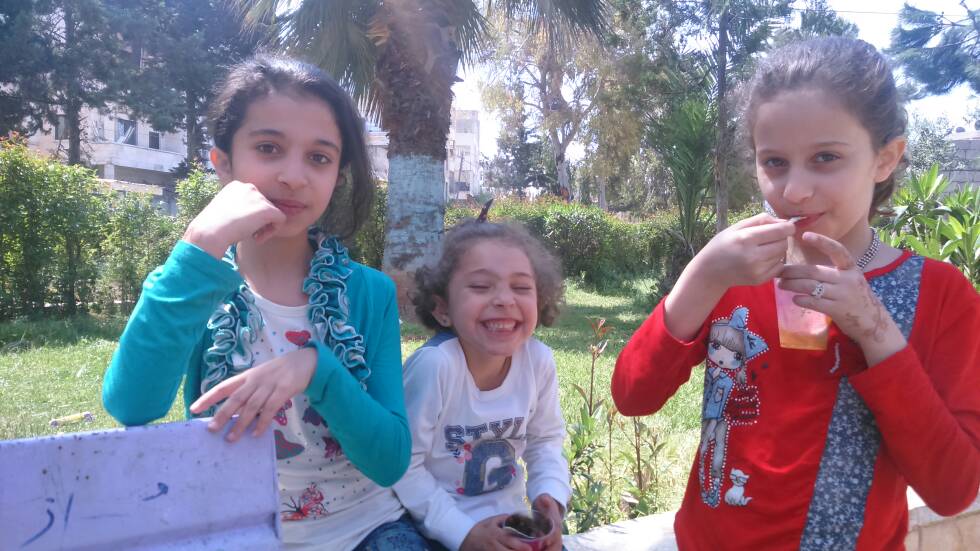
'Ghina Wadi was six years old when the war began, and 10 when she was shot in the leg by a sniper at a Syrian government checkpoint, outside the besieged town of Madaya last August. At 12, she now lives in one of the most dangerous cities in the world, and is grateful.
“On a normal day I pick fights with my brothers and sisters,” she said during an interview in Idlib City, the rebel-held city to which she was evacuated in April. She doesn’t like to talk about her time in Madaya, where dozens starved to death, and she doesn’t miss the town where she remembers having to burn sheets of paper for warmth.
She said she's happier now that she’s reunited with her grandparents in Idlib, but she didn’t really seem to understand the question: “Do you feel safer?” It’s not a question that makes much sense in Syria. What Ghina knows is shelling and airstrikes; “killing everywhere,” she said, because “Bashar al-Assad wants to take our land from us,” referring to Syria’s hereditary dictator.
There is no real safety in Syria, where over 400,000 people have been killed, according to a senior United Nations official's estimate, and an estimated 11 million have been displaced, either internally or abroad, since a revolution in 2011 morphed into one of the worst conflicts of the 21st century. And things appear to be getting worse.
According to UNICEF, the “killing, maiming, and recruitment of children increased sharply last year in a drastic escalation of violence across the country.” At least 652 children were killed, nearly 40 percent of them while at or near a school.
Ghina’s education is on hold: taking care of her younger siblings — and teasing them — is something of a full-time job. Her three-year-old brother grew up knowing only shortages of food. When he was introduced to ice cream in Idlib, he was surprised by how cold it was, and confused as to how to eat it.
The province of Idlib, held by a coalition of rebels ranging from the nationalist Free Syrian Army to the Islamist Ahrar al-Sham to the jihadist Tahrir al-Sham, would probably seem like a paradise to those who spent years on the brink of starvation. But Eden it is not.
“The situation in Idlib — it’s getting worse and worse,” said Zaidoun al-Zoabi, head of the Union of Medical Care and Relief Organizations (UOSSM), which supports medical clinics across Syria with supplies and personnel. “There is a shortage of everything. The most important shortage is in human resources. The reason for that is the migration of paramedics and physicians — and, of course, killing. This is a direct result of the systematic targeting of hospitals.”
At least 11 medical facilities have been bombed in Idlib City by Syrian or Russian jets, according to Physicians for Human Rights.
“People live in fear,” Ahmad al-Dbis, a pharmacist who works with UOSSM in Idlib said. The Syrian government and its Russian ally are “systematically targeting hospitals,” he said, disabling seven medical facilities in April. “That means denying thousands of people medical services,” he said.
And that is generally understood to be the point: to make life unlivable in areas controlled by the armed opposition and force people to choose between exile, death, or submission.
“The situation in Idlib City is very bad,” al-Dbis said, “because there is a very big number of refugees and displaced people, but there are only two hospitals for about 400,000 people.”
That’s a problem for Ghina, in particular. After she was shot in Madaya, her family’s neighbors moved away. “They couldn’t bear hearing her screaming any more,” her mother, Sahar said. After nearly two weeks and a campaign led by Amnesty International, she got lucky: the Syrian government — which, along with its allies in the Lebanese militia Hezbollah, was laying siege to the town at the time — agreed to evacuate her so she could receive surgery in the capital, Damascus..
After her trip to Damascus, she was sent back to Madaya — then evacuated again under a deal that saw the government lift its siege on the town in return for rebels lifting their own siege of two government-held towns, al-Fu'ah and Kefriya (dozens of the latter evacuees were killed in a terrorist attack).
But the kind of care available in government-held Syria is not to be found in Idlib, and Ghina needs more work. She’s received two surgeries thus far, but she still can’t bend her left knee and her left leg is now shorter than her right, a problem that will be exacerbated as she grows. “There is no serious medical care here in Idlib,” her mother said. Poverty is pervasive, as is the threat of death, most commonly from the air. To be “fine” in Idlib, according to Sahar, is to “have enough food for a couple of days.”
“Turkey,” she said — meaning leaving, and becoming refugees — “is the only choice.”
But Ghina hopes to go further than Turkey someday. If she could go anywhere in the world, it would be Paris; she wants to be an actress someday. “I like that tall metal tower,” she said.
For now, she’s a world away, in a place where it's a daily struggle to hold on to such dreams. And to simply stay alive.
“Nobody cares,” Ghina’s grandfather Kamal said. “Everybody is on their own in this city.” '

No comments:
Post a Comment